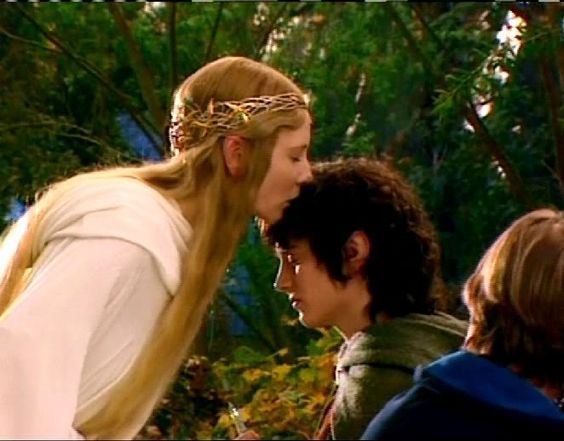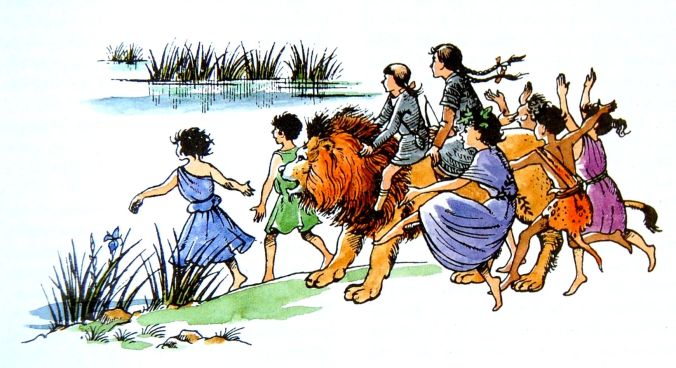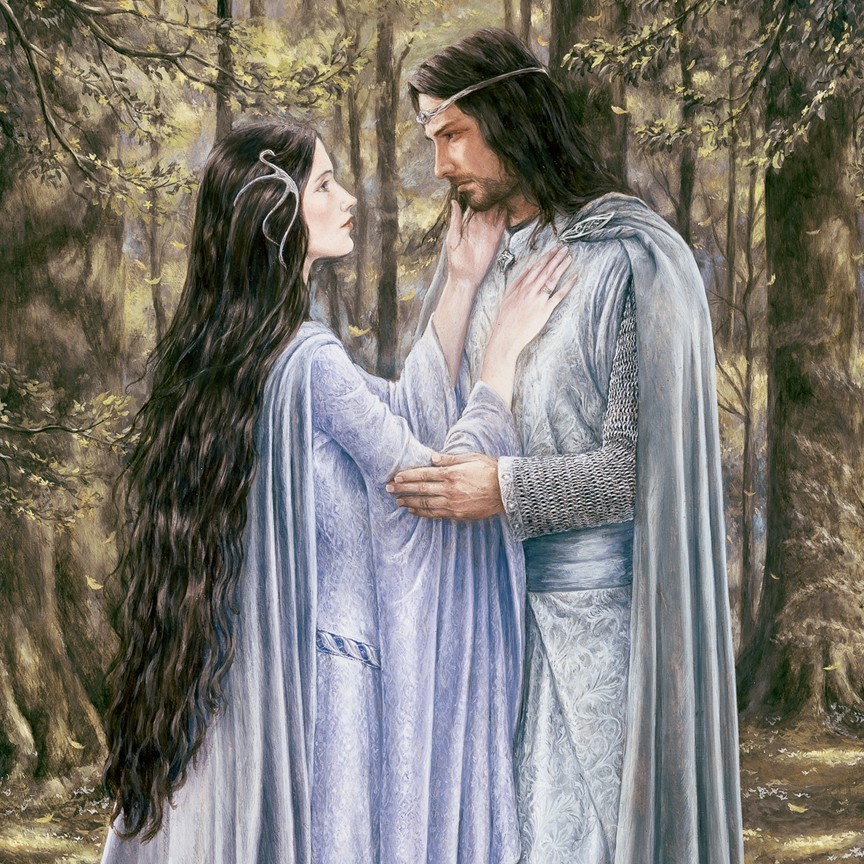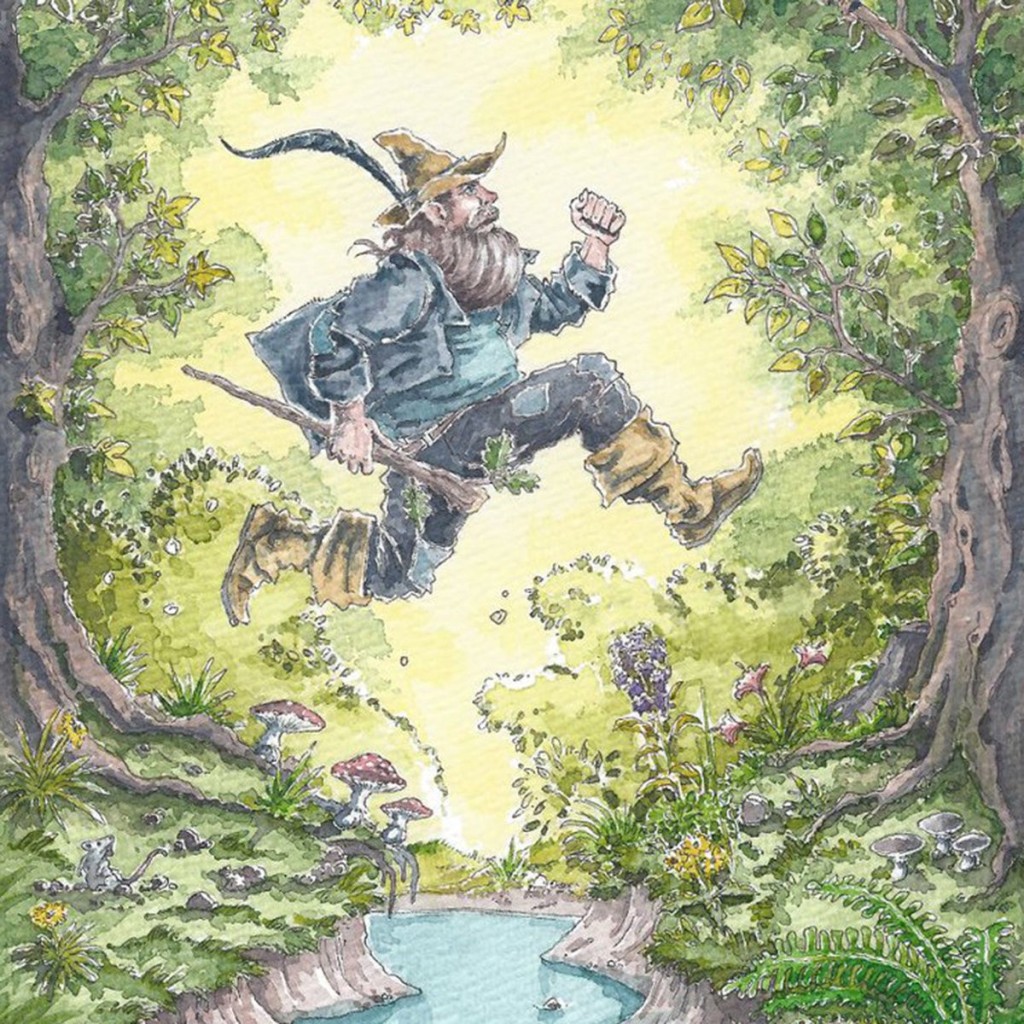The Two Towers by J.R.R Tolkien (Harper Collins 1991, 2007) pp. 866-874
Boromir “was alive and strong when we parted. And he lives still for all that I know”, says Frodo to Faramir. “Though surely there are many perils in the world.”

Anke Eissman depicts the moment when Faramir encounters the funeral craft of his brother, Boromir.
“Many indeed,” says Faramir, “and treachery not the least.”
Frodo stands before Faramir and his men as Faramir judges the truth of the story that Frodo tells and also the teller of the tale. How did Boromir die? And what part did Frodo play in his death? Was Frodo a traitor who betrayed his companion to his death at the hands of orcs?
Sam reacts to the implied accusation of treachery with fury and he tells Faramir to mind his own business much to the amusement of Faramir’s men, but Faramir is determined to find out the truth, in part because he wants to know what happened to his brother, in part because he wants to judge Frodo fairly.
What persuades him that Frodo is a truth teller is the story of Lothlórien. As soon as we learn that Faramir knows the most name of the hidden land we know, as we began to think about last week, that he is a man of wisdom. Laurelindórenan, he names it, the valley of singing gold. Treebeard also used the ancient name of that land when he spoke with Merry and Pippin, sadly remarking that just as the name was diminishing to Lothlórien or even Lórien so too the enchantment of the elder days was fading away.
Fading it may be but Faramir still understands its potency. In part this power lies in its beauty. Faramir thinks of the beauty of the belt in which his brother was arrayed in the boat from Lórien that Aragorn, Legolas and Gimli had sent him down the Anduin on the day of the breaking of the Fellowship. He also recognises the beauty of the broach of green and silver leaf that fastens Frodo’s elven cloak about his neck.
But Faramir also recognises the potency of Lothlórien in two other ways. One is in the mystery of Frodo himself. Right at the beginning of his journey Gildor Inglorien names Frodo Elf-friend and Goldberry recognises him as such in the house of Tom Bombadil. Gandalf sees a light shining within him and a certain transparency to his body when Frodo lies in Rivendell recovering from the wound that the Lord of the Nazgûl gave him at Weathertop. Sam saw this light too as Frodo slept in Ithilien, seeing that his face was “old, old and beautiful, as if the chiselling of the shaping years was now revealed in many fine lines that had before been hidden, though the identity of the face was not changed.”

Frodo and Galadriel in Lothlórien.
Frodo shares in the enchantment that comes from the elder days but is also marked by the wound he received at Weathertop and by the power of the Ring. Gandalf wondered which of these would prevail within him but concluded that he did not think that he would come to evil but might become “a glass filled with a clear light for eyes to see that can.”
Faramir is one who has such eyes and can perceive this light. “There is something strange about you, Frodo, an Elvish air maybe”, he says. But here we recognise the third element of the potency of Lothlórien that Faramir perceives. Its peril. “It is perilous for mortal man to walk out of the world of this Sun, and few of old come thence unchanged.”
There are tales in so many cultures of mortals straying into Faerie and emerging changed. Later Faramir will speak of what change came over his brother to Frodo and Sam. Now he merely asks the question and perceives something of the beauty and the peril in Frodo.
There is much talk now of re-enchantment and who would deny the need for this in a dying world. But might there be a naive optimism about such speech? We want the beauty without the peril. In C.S Lewis’s Prince Caspian Susan says of the Maenads who surround her and Lucy and who unleash glorious chaos in a Narnia that is dying of rationalism that if Aslan were not with them she would be very afraid. The Christian wisdom of the Cross recognises both the healing that flows from it but also its horror. We cannot separate the two but would love to reduce our desire for re-enchantment to little more than a pleasant walk in the country or a neatly tendered border of pretty flowers in a garden. There is beauty in both of these but this is not the perilous beauty of re-enchantment. It is not what Faramir perceives in Frodo. He perceives it yet he has the wisdom to trust it.

Pauline Baynes wonderful illustration of Susan, Lucy, Aslan and the Maenads from Prince Caspian by C.S Lewis. One of my favourite scenes from the entire Chronicles of Narnia.










